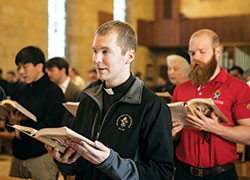Shocked by Church crisis, seminarians are more dedicated to priestly formation

Transitional Deacon Vincent Gilmore, a member of St. Monica Parish in Indianapolis, sings on April 20 during a Mass in the St. Thomas Aquinas Chapel at Saint Meinrad Seminary and School of Theology in St. Meinrad. (Photo courtesy of Saint Meinrad Archabbey)
By Sean Gallagher
Seminarian James “JJ” Huber was stunned when the current clergy sexual abuse crisis began to make headlines in June with the revelation that retired Archbishop Theodore E. McCarrick of Washington was accused of sexually abusing a minor more than 40 years ago, and subsequently sexually harassing seminarians and young priests while advancing in Church leadership in the U.S.
Then came the release of a Pennsylvania grand jury report in August detailing hundreds of cases of clergy sexual abuse in six dioceses over several decades.
Huber said he felt “outrage and fury” about both the instances of sexual abuse and the way in which Church leaders in the past covered up abuse. He was also frustrated that current Church leaders were talking about the need for change and reform, but not yet taking action.
Then Huber assisted at a “Holy Hour for Prayer, Penance and Healing” on Sept. 15 at SS. Peter and Paul Cathedral in Indianapolis.
At the start of the holy hour, Huber knelt just a few feet away from Archbishop Charles C. Thompson who, in a sign of penance, prostrated himself for several minutes.
“Archbishop Thompson wasn’t making more promises,” said Huber, a member of St. Gabriel Parish in Connersville. “He was doing something. He was laying on the floor prostrate saying that we are sorry as the Church for what’s happened. God have mercy on us. You get cold chills thinking, ‘My archbishop is doing something. He’s not just saying words. He’s doing something.’
“That moment of his leadership was so powerful. It told me that I have to do something.”
That something was to dedicate himself anew to the priestly formation he is receiving at Saint Meinrad Seminary and School of Theology in St. Meinrad.
“One of the greatest things I’ve seen, especially from my brother seminarians, is that I haven’t seen anybody who is drawing away from their discernment because of this,” Huber said. “If anything, they’re rushing into it even more in order to say, ‘This isn’t going to happen again on my watch. I’m going to be better to make sure that the people of God don’t ever have to go through this again.’ ”
One of those seminarians is transitional Deacon Vincent Gilmore, a member of St. Monica Parish in Indianapolis who will be ordained a priest for the archdiocese next June.
But at first, like Huber, he was “shook up” by the crisis.
“I was experiencing some of the horror of just how bad this thing was,” said Deacon Gilmore. “On the one hand, it wasn’t so much new things happening today. That was some small bright spot. But on the other hand, we’re just seeing the past appear worse and worse. I asked myself, ‘How much worse is this going to get?’ ”
Yet through prayer and the support of his fellow seminarians and formation staff at Saint Meinrad, Deacon Gilmore is more convinced than ever of God calling him to priestly ministry at this particular time in the Church.
“In some ways, I’m looking forward to it more,” he said. “I’m feeling motivated to be part of this new generation of priests who give a positive response to this. That’s what often happens in history. Unfortunately, it usually takes a crisis to lead to a large-scale conversion in the Church, but, by the grace of God, we rise up to the challenge.”
Seminarian Sam Rosko shares that conviction.
“It’s a sad and quite disgusting thing that’s happened,” said Rosko of instances of clergy sexual abuse. “You have to acknowledge that.
“But I think it’s given me a new resolve to, if it’s God’s will, to be a good and holy priest and, through God’s grace, try to undo the bad things that they’ve done and be a beacon of hope and of light in the Church, bringing Christ to the people.”
Rosko, a member of Our Lady of the Most Holy Rosary Parish in Indianapolis, is a third-year seminarian at Bishop Bruté College Seminary in Indianapolis.
He noted how the formation staff at Bishop Bruté has helped the seminarians there cope with the current clergy sexual abuse crisis. There have been many formation sessions that have addressed it. And a listening session was held at the start of the academic year in which seminarians could talk with each other and the formation staff about this challenging time in the life of the Church.
Some of the news related to the crisis involves charges of an atmosphere in some seminaries that tolerated sexual misconduct among seminarians. Seminaries in three archdioceses in Massachusetts, New Jersey and Pennsylvania are currently being investigated in response to those charges.
Rosko says that the community life at Bruté is nothing like what has been alleged as happening at other seminaries.
“I wasn’t for a second worried about myself or if that would ever happen here,” he said. “We have a very healthy environment here at Bruté. Our formation staff is very good and caring.”
Huber echoes that assessment for Saint Meinrad.
“I can confidently say that I have no fear of that at Saint Meinrad,” he said. “None at all. I’m very proud to be a seminarian at Saint Meinrad for the Archdiocese of Indianapolis.” †
Related: Demanding program of human formation shapes future priests amid Church crisis
